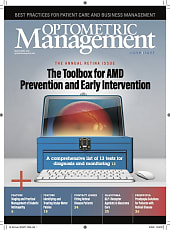BUSINESS
business strategies
What’s the Worst That Could Happen?
Don’t let the fear of risk cripple your practice’s growth
GARY GERBER, O.D.

As a group, O.D.s are severely risk averse. And, in my experience, they are so opposed to risk that it greatly impedes them from growing their practices.
Negative “what ifs”
When posed with any business decision, optometrists as a group tend to focus on the possible negative outcomes, rather than the positive ones, giving the negative outcomes more power than they deserve.
In fact, the two words, “What if” have cost doctors millions upon millions of dollars: “What if I hire that last interviewee, and he doesn’t work out?” “What if I buy that new OCT, and patients object to an additional fee?” “What if I take in that new line of frames, and they don’t sell?”
I get it. You’re worried about making a mistake that could hurt your practice. But, guess what? In nearly every similar entrepreneurial business decision, the worst case scenario isn’t that bad, and you can rectify it fast.
Minimal damage
“New Coke,” released in 1985, was a disaster. Loyal Coca-Cola drinkers immediately rejected it, prompting the company to bring back the original formula under the name, “Coca-Cola Classic.” Coke got creamed. They made a bad business decision and paid the price. It took a long time for the company to recover.
Yet, in our offices, that doesn’t have to be the case. In any of the previous examples, or in hundreds of others, if you’re wrong, you can readily move on with minimal damage.
If you make a bad hire, you should quickly fire that person and learn from your mistakes. Does your interview process need help? Did you actually check references? Or, did you use “best practices” for hiring and still get burned? If so, take a step back, and realize that a few weeks with a poor employee should not have practice-destroying consequences. Yes, you may have lost a few patients or a few dollars, but if you cut the cord quickly, you’ll suffer little long-term damage.
If you buy a new piece of equipment, and it doesn’t work out, you have a few not-so-great options, but none of them are catastrophic. You can try to return it (unlikely) or sell it at a loss. Neither of these options signal your total demise.
And that new line of frames? If you take in an inventory and not a single one moves? Again, it’s not ideal, but you can cut your losses by marking them down and getting rid of them, selling them to a colleague who does great with them (perhaps your friend who recommended them?) or, the absolute worst case scenario, donate them and move on. Yes, none of these options are great solutions, but none of them will put you out of business either.
The bottom line: A smart doctor acknowledges and leverages the ability that every small business has, and most big businesses lack — the ability to be wrong and move fast to correct mistakes.
No risk, no reward
With careful planning and taking educated and calculated risks, most of your business decisions will expand your practice. Once you consider that the risks involved for most of what we deal with on the business side of our practices are minimal, you should feel at ease that even if a certain decision doesn’t work out, it’s not so bad. OM
DR. GERBER IS THE PRESIDENT OF THE POWER PRACTICE, A COMPANY SPECIALIZING IN MAKING OPTOMETRISTS MORE PROFITABLE. LEARN MORE AT WWW.POWERPRACTICE.COM, OR CALL DR. GERBER AT (888) 356-4447.



